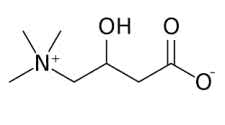When you think of carnitine, do fat- burning properties and ripped abs come immediately to mind? Great - you go to the head of the class. But don't rest too comfortably; the world of science has recent]y found that carol- tine may have an effect that's even more important to
bodybuilders and strength- power athletes: It could increase your bodyweight and muscle mass. Carnitine is essentially an amino acid that's involved in moving long-chain fats into the "powerhouses" of your cells, the mitochondria. Your body uses these fats as fuel, so carnitine
acts like a shuttle, but is not itself directly involved in energy production. As far as the two forms of carnitine are concerned, L-carnitine is the physiologically active form and is the type generally used as a dietary supplement; D-carnitine is of little value to the athlete.
Beefed-Up Chickens
In an attempt to better serve consumers, animal science is typically interested in ways to get more meat on farm animals. Basically the more meat the better (sound familiar?). Of course, one way to get farm animals bigger is to just feed them more. A no-brainer you say? The problem
is that the more you feed these critters, the less profit you make. But if you could get these animals bigger without feeding them more - now you're talking. That's where carnitine comes in.
When a group of animal scientists in Hungary decided to find out how carnitine might put more beef on chickens, they gave young birds experimental diets that differed only in the amount of carnitine given (zero, 50, 100 or 150mg per kg bodyweight). After two weeks on the
carnitine-supplemented diet, the chickens were on average 9% heavier and their bodyfat dropped by about 18%.
So anywhere from 50-450 mg of carnitine per kg of bodyweight (or about 23-68 mg per pound) daily made for more huff chickens. In a follow-up study, older chickens were given three experimental diets that differed in energy density (calories per unit weight of feed), but each diet
had identical protein levels. Also, half the chickens were supplemented with carnitine (50 mg per kg bodyweight, about 23mg per pound). As expected, the chickens fed the most calorically dense tiler gained the most weight. Carnitine, however, improved bodyweight gain regardless
of the type of diet the chickens consumed.
For example, bodyweights were higher in the carnitine-fed chickens by 1.7%, 5-3% and 6.5% in the low-, medium- and high- energy intake groups, respectively. So it seems that carnitine supplementation has a synergistic effect with caloric intake. That is, the more you eat, the better
an effect carnitine might have with regard to bodyweight gain.
But was this bodyweight gain muscle or fat? Not only was the weight of the breast and thigh muscles 4%-7% and 7%-14% higher in the carnitine-fed chickens, but the amount of abdominal fat was I 1%-18% less, Bigger chickens, less fat sounds like good chicken soup to me.
These findings have actually been replicated in fish, foals and pigs. For instance, pigs given carnitine (250-1,000 mg per kg bodyweight, or about 114-455 mg per pound) had a greater average daily gain in bodyweight than those not given carnitine. The doses used in these studies are
within the reasonable range of doses that humans, even bodybuilders, can consume. A 50-mg-per-kg bodyweight dose is equivalent to 4.5 grams of carnitine for a 200-pound individual.
Of Chicken & Bodybuilders
Now you're probably thinking that if a chicken can gain up to about 10% in bodyweight and lose around 20% fat, that could translate into enormous changes for the physique athlete. For a 200-pound bodybuilder with 10% fat (20 pounds of fat), a weight gain of 10% would take him to 220
while dropping his total fat from 20 to about 16 pounds. Wow!
Before you go nuts and start downing carnitine pills like breakfast cereal, keep in mind that the tremendous changes seen in chickens probably won't happen in humans (unless, of course, you have a beak and walk with a strut). But seriously we don't know exactly how carnitine might
affect muscle mass and bodyweight in humans. We do know, however, that the trends seen in this study show potential benefits of carnitine that go beyond burning fat.
So what's the best advice for supplementing with carnitine? Carnitine is found in a variety of foods, especially meats. Beef has something like 300 times more carnitine than bread: for instance, a 3-ounce steak has about 60 tug of carnitine, So if you consume a lot of meat, I'd
suspect that you're getting a good bit of carnitine.
Will more help?
At this point, no Recommended Dietary Allowance exists for carnitine, but trying 2-4 grams daily (though this is lower than what was used in the research I reviewed) seems to be a good start. Since we all don't respond identically to various supplements, though, you
may he a responder (or nonresponder) to this supplement's varied effects.
